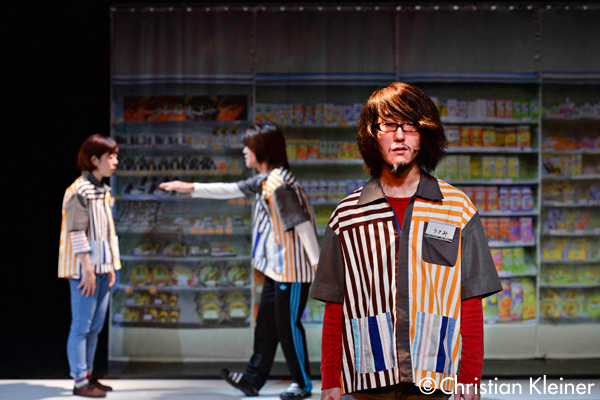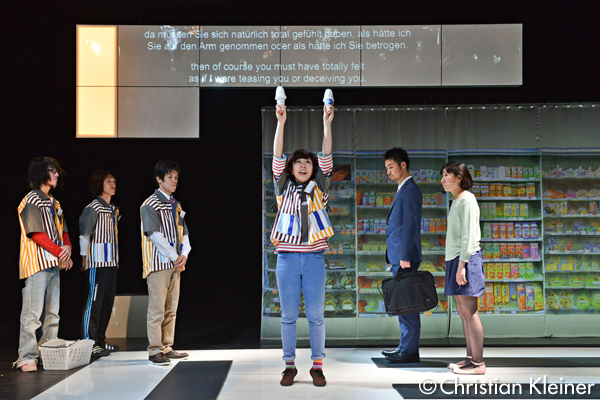Enter the convenience store part-time employees Igarashi and Usami. For a while, Usami starts griping about the fact that most of store’s needless income loss is due to the Manager’s ineptness at procurement.
Customer 1 (female) enters the store. As if drawn by its lure, she comes to the store in the middle of the night and buys ice cream. She wanders around the store and then leaves to the sound of the employees obligatory, “Arigato gozimashitaaa…” (Thank you).
The store’s Manager is introducing the store. The sales floor area is 100 square meters, and on sale in it are approximately 2,500 varieties of products, with the chain’s generic brand goods occupying a particularly important place….
The Manager introduces the new part-timer, Mizutani. Usami says that the look and feel of cleanliness is a convenience store’s most important quality, so he wants the newcomer to begin by learning the proper methods for keeping the store neat and clean. In contrast, Igarashi says, “It’s just a convenience store job, so just do the work and don’t take it too seriously,” with his consistently condescending air.
Customer 2 (male) enters the store and begins ranting in monologue about how he can’t understand how anyone could stand such an unrewarding job as working part-time at a convenience store and voicing his disbelief at the fact that people like these employees could work in such a horrible state in this unfair society with its entrench stratification and income gaps before he walks out of the store. Once the man is gone, Igarashi says to the new part-timer, “Don’t bother thinking a guy like that isn’t a customer.” He goes on to say that, even with the kind of guys like that who just come in to stand at the magazine rack and read without buying anything, we just give them the same [polite] greetings as any customer. There is no need to even think about it.
The new part-timer talks about the barcode reader, saying that sometimes it doesn’t beep with the signal that it has read the barcode no matter how many times she puts it to the code, even though she is sure that she is flashing it on the code correctly. She is flustered at being unable to get it to read the barcode on the ice cream that Customer 1 has brought to the checkout counter. The Manager comes and explains that the ice cream product she is trying to buy is one that the chain’s head office has decided to stop carrying and has been taken of the barcode list. The ice cream product that Customer 1 is trying to buy is called “Super Soft Vanilla.” Customer 1 is deeply disappointed, saying, “But I loved this flavor so much!”
Mamiya, a Supervisor from the head office arrives. He takes out a hand-held microphone and begins criticizing stores that reduce their ordering because they are afraid of income losses due to inventory waste.
The store Manager talks about a dream he had. Two of the unsold “Salmon & Scallion on Rice” box lunches lay one on top of the other on the shelf and were wriggling as they copulated. And there I was waiting for the product of their propagation to lead to more income loss due to unsold waste….
The head office has accepted the proposal put forward by the store’s Manager for a new way of handing change back to the customer as a means to improve the customer service approval rating, but the Supervisor continues his criticism, saying that such a measure won’t improve or make up for the store’s poor sales record.
Usami tells the new part-timer that it is a rewarding and truly enjoyable feeling when the predictions you base your ordering on turn out to be right [and the full order sells]. As for Igarashi, he fantasizes about messing up the sales data so it’s impossible to make successful predictions.
The store’s Manager is teaching the employees about the new way of handing change to a customer. The action is something he copied from a Korean student named Lee who had worked part-time at the store for a while earlier.
The Supervisor talks about the mythology of convenience stores. Once upon a time long ago on the night of a new moon, a flying object in the shape of a convenience store landed on Earth. With the arrival of the convenience store all of the problems of humankind were solved!
When Customer 2 comes into the store again, Usami confronts him, saying, “Have you come to give us some more of your cheap preaching? You have never bought a single thing in this store, have you? You are forbidden to ever come in this store again. Never.” Customer 2 counters, asking how the human race can free itself from places like this that plot to control the consumer. The only thing we can do is to resist by not buying anything here.
The new part-timer talks to Customer 1, who is in the store again. He tells her that a new ice cream product named “Super Premium Soft W (Double) Vanilla Rich” has been introduced and adds that it is a new, improved version of the “Super Soft Vanilla” product that she liked so much. Customer 1 feels as if the whole in her heart that was left when her favorite ice cream was discontinued will now be healed again.
The store Manager tells the employees that new policy of bringing out new products every week is going to breathe new life into the chain’s convenience stores.
It is the day of the launch of the new ice cream product “Super Premium Soft W (Double) Vanilla Rich.” Customer 1 has come to the store and the new part-timer hands her a package of the ice cream. She makes the purchase and the three store employees see her off. When Usami says, “Isn’t this warm feeling so great?” Igarashi criticizes the new part-timer’s [overly sweet] treatment of the customer (1) as, “Smile dumping.” And when Igarashi proposes that they all reject the new method for handing change to customers, the new part-timer says that she can’t get into that kind of defiant behavior.
Usami talks about the “metabolism” of the convenience store. In the course of a year, about 70% of the products are dropped from the active inventory and the other 30% remain. Thirty percent stay and 70% are dumped. I wonder which of these two groups I’m in.
Customer 1 comes into the store and complains that the new ice cream flavor is completely different from what she expected. She feels once again that it is some kind of jinx: the products she falls in love with never turn out to be popular. She wonders if it is some kind of curse she has that keeps things from becoming popular successes.
When the angry Customer 1 says that she wants to talk to someone from the head office, the voice of the Supervisor comes over the loudspeaker, saying mercilessly, “Anyone knows that worthless products that don’t sell have to be circulated out of the inventory as fast as possible.” Saying that she will take responsibility for having misled the customer, the new part-timer formally resigns her job and leaves the store.
The Supervisor informs the store Manager that his new method of giving change to customers has been dumped. Being told yet again that everything he does turns out for the worse, the Manager is fed up and just walks out of the store.
When Customer 2 comes in the store to use the toilet, Usami refuses to allow it, saying, “We have no toilet for the likes of you.” Igarashi states his agreement on that point and adds, “Isn’t the reason the customers look down on us because the convenience stores spoil them …?




